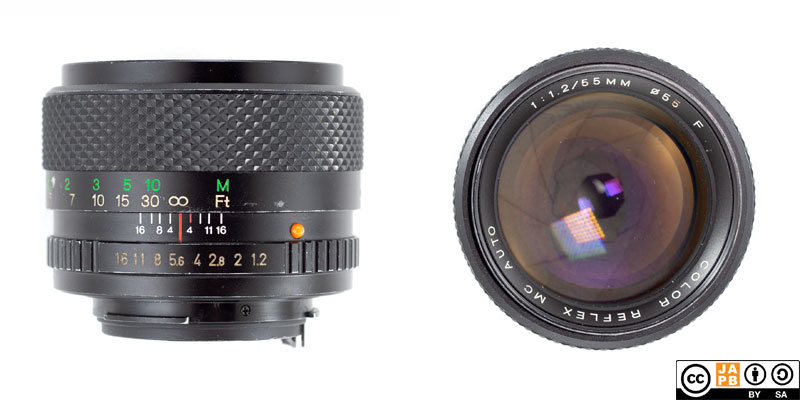Pekka Buttler, 03/2023

Specifications
The table below summarizes the lens’ key specifications:
| Brand: | Porst | Lens name | Color Reflex MC AUTO 1:1.2/55 mm F |
| Focal length(s) 1 | 55 mm | Angle-of-view 2 | 43° |
| Maximum Aperture | f/1.2 | In Production | ≈1975–1980 |
| Lens mount | Pentax K | Subfamily (if applicable) | K |
| Length 3 | 46,6 mm | Diameter 4 | 64,8 mm |
| Filter ring diameter | 55 mm | Weight | 325 grams |
| Lens element count | 6 5 | Lens group count | 4 |
| Aperture blades (S/R/C) 6 | 8 S | Focus throw | ≈180 ° |
| Minimum focusing distance | 60 cm | Maximum magnification | 1:8,8 |
| Has manual aperture ring | YES | Has Manual focus ring | YES |
| Aperture mechanism type | Automatic | Aperture click stops 7 | 1.2-2-2.8-4-5.6-8-11-16 |
Further notes:
• While the basic method of operation of rebranders such as Photo Porst has always been to source their gear (cameras, lenses, accessories) from OEM sources, this usually still allows one to – with a high level of confidence – identify the original designer/manufacturer. Not so in this case.
• In simple terms, there seem to been no other lenses like this (Pentax K mount, 55 mm focal length, f/1.2 maximum aperture, 55 mm filter thread, 8 aperture blades). Hence, there is a possibility that this lens is a not a simple rebrand, but is rather an adaptation of one of the many Tomioka-inspired m42-mount 55 mm f/1.2 to a Pentax K mount
History
See the JAPB company profile on Porst for more information on the company.
Porst sourced its lenses widely. While some of Porst lenses – as here is the case – were direct rebrands of identical lenses of major brands, most were sourced from (mostly Japanese) off-brand/OEM manufacturers. While the origins of such lenses (or at least a family resemblance) can often be discerned, this specific lens defies such sleuthwork.
Adapting
As this lens uses the Pentax K mount, you will be able to – without issues – use this lens natively on a wide range of Pentax SLRs and dSLRs (as well as some 3rd party SLRs).
Adapting this lens to a mirrorless, full-frame digital camera is a breeze thanks to the lens having full manual controls (aperture ring, focus ring). The only thing you need is a simple, dumb adapter to bridge the difference in flange focal distances. Moreover, because the Pentax K mount is rather popular, a broad range of specialised adapters (including helicoid adapters, tilt/shift adapters and speed boosters
Besides using this lens natively on a Pentax SLR/dSLR, adapting this lens to other dSLR/SLR mounts is possible, but varyingly easy. With the Canon EF and Four Thirds mounts, using Pentax K lenses is not a problem, as a simple adapter ring will do. With other dSLR mounts (e.g. Sony/Minolta A, Nikon F) you cannot reach infinity focus without using an adapter with corrective optics. In either case, you will be forced to use manual aperture (wide open for composing and focusing / stopped down for metering and picture-taking).
Footnotes
- Focal length is (unless stated otherwise) given in absolute terms (not in Full-frame equivalent), and according to the manufacturer’s naming practice (which does not always reflect the lens’ actual field of view). For an understanding of whether the lens is wide/tele, see ‘Angle-of-view’. ↩︎
- Picture angle is given in degrees and concerns the diagonal picture angle. Rule of thumb:
> 90 ° ==> Ultra-wide-angle
70–90 ° ==> Wide-angle
50–70 ° ==> Moderate wide-angle
40–50 ° ==> ‘Standard’ or ‘normal’ lens
20–40 ° ==> Short tele lens
10-20 ° ==> Tele lens
5-10 ° ==> Long tele lens
< 5 ° ==> Ultra-tele lens ↩︎ - Length is given from the mount flange to the front of lens at infinity. ↩︎
- Diameter excludes protrusions such as rabbit ears or stop-down levers. ↩︎
- Information on element and group count are based on rather spurious online sources ↩︎
- S=straight; R=rounded; C=(almost)circular at all apertures. ↩︎
- Numbers equal aperture values on aperture ring; • intermediate click; – no intermediate click. ↩︎